Building a Dream
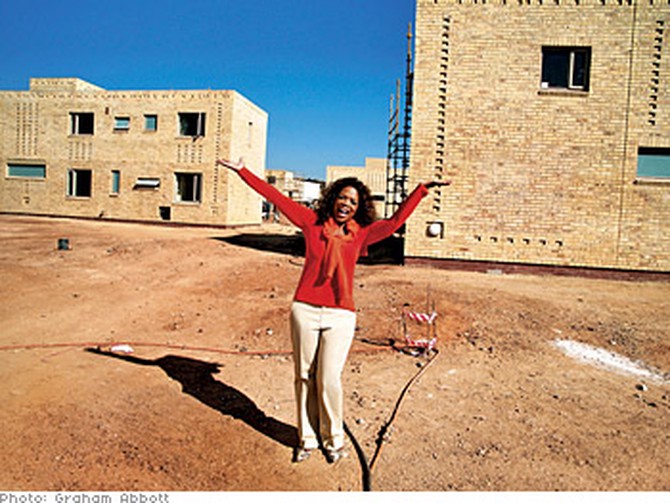
It's a seemingly ordinary August morning, but it will be no ordinary day in the city of Johannesburg. Oprah Winfrey is here to view the new school she has dreamed of for South Africa. Beyond inspecting the handiwork of the builders, she has come to personally select girls for the founding 7th and 8th classes. From poor, troubled backgrounds, these too are no ordinary girls. Many have been hand-chosen by teachers across South Africa for academic excellence and early displays of leadership. On the cusp of adolescence, they are 11, 12, and newly-turned 13 years old.
At 52, Oprah feels her most important work has just begun. The Oprah Winfrey Leadership Academy for Girls—South Africa is an innovative high school whose aim is to discover, teach and inspire young South African girls to become a new generation of leaders. It is the first of several she hopes to build in struggling communities on every continent. She's looking for brave girls, children who have already conquered adversity with a feeling of "I can!" That dream began for her a long time ago.
The idea of a school strikes the deepest chord in Oprah. "My own success has come from a strong background in reading and learning. The greatest gift you can give is the gift of learning." And so began her quest for special girls who want to learn, "bright-eyed wonders who have struggled in life," Oprah calls them. "I want somebody who already knows that education is empowerment, and who wouldn't have had the chance to fulfill the great possibilities of her life had this not happened. I want to change the trajectory of a child's life."
At 52, Oprah feels her most important work has just begun. The Oprah Winfrey Leadership Academy for Girls—South Africa is an innovative high school whose aim is to discover, teach and inspire young South African girls to become a new generation of leaders. It is the first of several she hopes to build in struggling communities on every continent. She's looking for brave girls, children who have already conquered adversity with a feeling of "I can!" That dream began for her a long time ago.
The idea of a school strikes the deepest chord in Oprah. "My own success has come from a strong background in reading and learning. The greatest gift you can give is the gift of learning." And so began her quest for special girls who want to learn, "bright-eyed wonders who have struggled in life," Oprah calls them. "I want somebody who already knows that education is empowerment, and who wouldn't have had the chance to fulfill the great possibilities of her life had this not happened. I want to change the trajectory of a child's life."
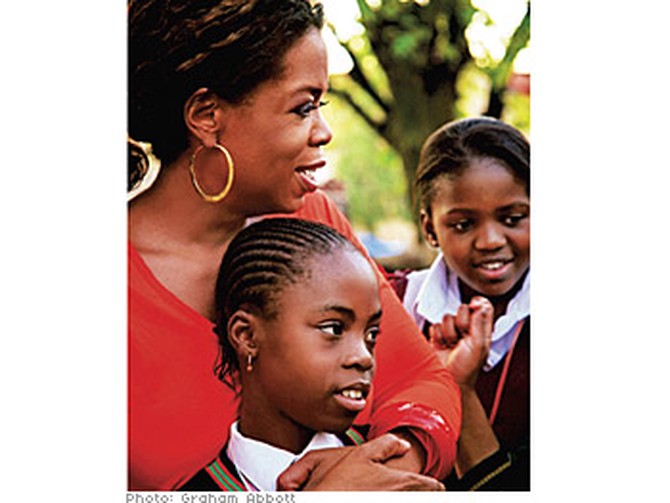
Oprah has chosen South Africa as the birthplace of this intensely personal work because "it is the country of new beginnings, only 12 years out of Apartheid, and also because of my deep love for Nelson Mandela and all that he means to this country and to the world." In a country where violence against females is epidemic, where many girls under the age of 10 have already been raped, where the estimate for HIV infection in children and adults is one in eight, and more than 36 percent of black women are unemployed, often illiterate, and subsisting in tin shanties, a chance like this for a young African girl is akin to suddenly finding yourself on a rocket to the moon.
Creating this school has not been easy, logistically or socially. From the beginning, she struggled to explain her vision, a school that could "contain the emotional, spiritual selves of the girls." Because these girls come from poverty, she was first given designs she felt looked like a chicken coop, then a barracks. Planners advised that these African children were not accustomed to much—many sleep on dirt floors in housing with no water or electricity; some share a bed with relatives. Oprah was told that the simplest environment would be a luxury to them, that they would need only basics. She sent the plans back. "I said, from the start, I am creating everything in this school that I would have wanted for myself—so the girls will have the absolute best that my imagination can offer." In 2002, she announced her plans to build a leadership academy and donated $10 million for the school. Her donation has grown into more than $40 million.
Creating this school has not been easy, logistically or socially. From the beginning, she struggled to explain her vision, a school that could "contain the emotional, spiritual selves of the girls." Because these girls come from poverty, she was first given designs she felt looked like a chicken coop, then a barracks. Planners advised that these African children were not accustomed to much—many sleep on dirt floors in housing with no water or electricity; some share a bed with relatives. Oprah was told that the simplest environment would be a luxury to them, that they would need only basics. She sent the plans back. "I said, from the start, I am creating everything in this school that I would have wanted for myself—so the girls will have the absolute best that my imagination can offer." In 2002, she announced her plans to build a leadership academy and donated $10 million for the school. Her donation has grown into more than $40 million.

Before interviewing the girls, she is on her way to see the first manifestations of her dream, the place she is preparing for them. One hour south of Johannesburg, past the old gold mines to a sleepy village called Henley-on-Klip, the academy sits on a 52-acre site suggested by the Department of Education. A year ago, it was mere foundations. Now it's a full campus with 28 buildings nearing completion. At first glance, the effect is an unusual combination of functionality and elegance. The architecture has African roots, quiet, earthy, beautiful. The bricks, chosen by Oprah, echo the soft gold of the sand on which the school is built, making it seem as if it sprang up organically from the earth. It belongs here, the way Oprah feels she does.
This is a school built with love. There is a path called Street of Living to the dormitories, and another, Street of Learning, to the classrooms, symbolizing the merging of life lessons and academic study. "You can't avoid passing the library," Gayle says, who accompanies Oprah on a tour of the campus. With Oprah's deep love of books, she has created the library she wished for as a girl, arranging plush seating around a welcoming fireplace, "so the girls can read by the fire and spend time there with their friends."
This is a school built with love. There is a path called Street of Living to the dormitories, and another, Street of Learning, to the classrooms, symbolizing the merging of life lessons and academic study. "You can't avoid passing the library," Gayle says, who accompanies Oprah on a tour of the campus. With Oprah's deep love of books, she has created the library she wished for as a girl, arranging plush seating around a welcoming fireplace, "so the girls can read by the fire and spend time there with their friends."
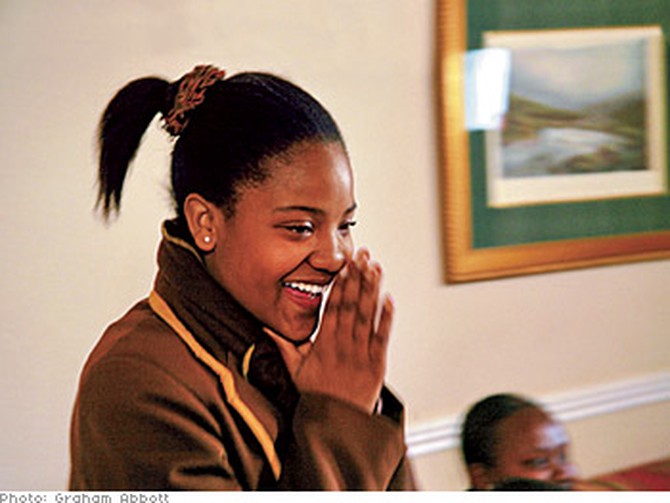
Oprah envisions the school as much more than a great institution for learning. It is a home, and has to be aesthetically pleasing. "When you have a beautiful environment," she says, "it inspires beauty in you. That's what I want to do with these girls." She has also commissioned artwork by both renowned and emerging artists from all over South Africa so that the girls can live in appreciation and celebration of their heritage.
Every classroom has an outdoor teaching space, sometimes a garden. A leafy tree shading cool benches provides a place where Oprah imagines a girl can "sit with a book or be with [her]self." Amid these soulful elements, the school will offer state-of-the-art technology, a gym, and, at Oprah's insistence, a magnificent amphitheater, "for expression, art, poetry reading, and oratory." Great leaders need to be great orators.
Every tile, door handle and finish has been Oprah's particular choice. In the dormitories, each with its own small kitchen and terrace, Oprah's touches abound. She has chosen white sheets, towels for their softness, pillowcases bearing an embroidered O, and the colors for the bathroom tiles—orange, green and happy yellow. The girls will sleep two to a room, each with her own spacious closet and desk. Hearing at the preliminary interview rounds that each girl will have her own bed, some of the candidates leapt with joy. "My own bed! That will be like heaven!" one cried.
Oprah sits down on a bed. "It's everything I asked for," she says quietly. She smoothes the sheet, as if readying it for her special girl. "They are my daughters now," she says.
Every classroom has an outdoor teaching space, sometimes a garden. A leafy tree shading cool benches provides a place where Oprah imagines a girl can "sit with a book or be with [her]self." Amid these soulful elements, the school will offer state-of-the-art technology, a gym, and, at Oprah's insistence, a magnificent amphitheater, "for expression, art, poetry reading, and oratory." Great leaders need to be great orators.
Every tile, door handle and finish has been Oprah's particular choice. In the dormitories, each with its own small kitchen and terrace, Oprah's touches abound. She has chosen white sheets, towels for their softness, pillowcases bearing an embroidered O, and the colors for the bathroom tiles—orange, green and happy yellow. The girls will sleep two to a room, each with her own spacious closet and desk. Hearing at the preliminary interview rounds that each girl will have her own bed, some of the candidates leapt with joy. "My own bed! That will be like heaven!" one cried.
Oprah sits down on a bed. "It's everything I asked for," she says quietly. She smoothes the sheet, as if readying it for her special girl. "They are my daughters now," she says.
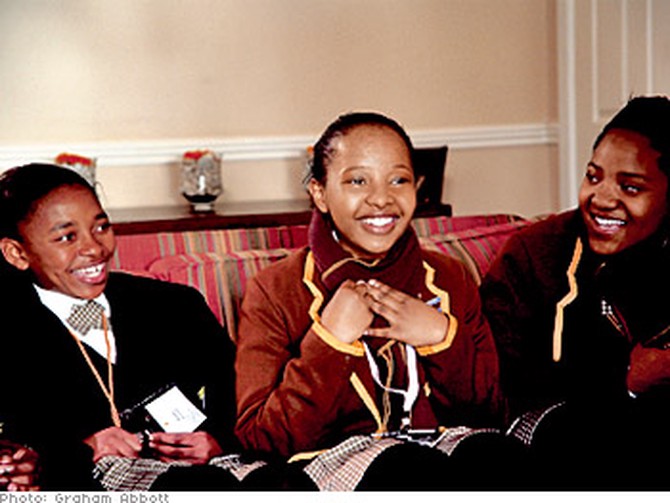
In a moment of reflection, Oprah prepares for the most exhilarating part of this day, meeting with the girls. "This past year, when I realized that this is going to happen, I started dreaming about them. And in my dream, they would be blurred. I'd be trying to see their faces...I would ask their names, and just as they went to speak, I would awaken," she says. "Yesterday I met a few of them for the first time. I realized those were the names, those were the faces in my dream."
These young faces exude hope, possibility, promise. "Yesterday I asked an 11-year-old, 'Why do you want to come to this school?' and she said, 'It is my tomorrow!' They are already wonderful. They are my dream girls."
These young faces exude hope, possibility, promise. "Yesterday I asked an 11-year-old, 'Why do you want to come to this school?' and she said, 'It is my tomorrow!' They are already wonderful. They are my dream girls."
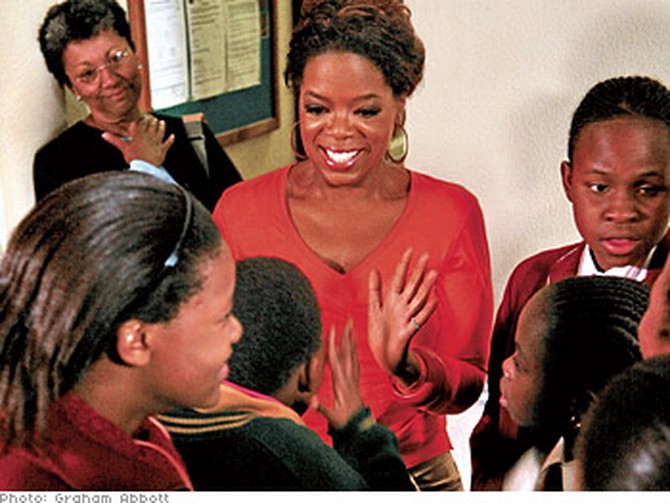
Thirty young girls wait in the sunlit afternoon in the neat uniforms of their current schools, sporting proud badges—Class Captain, Head Prefect. One by one, they will enter the room and stand in utter disbelief that Oprah herself is here to meet them. One girl has lost the vision in her left eye. "Is it my eyes...," she hardly dares whisper, covering her mouth with both hands, thinking her sight is playing tricks on her. "No, it's really me!" Oprah says warmly. "Are you nervous? Give me a hug! Let's get rid of the nerves!" And so the conversations begin.
"Why do you want to come to my school?" Some see themselves as financial burdens on their families. For others, it's a dream for the future. "I have these things inside me and I want to let them out! And I want to help others let them out!" says one.
"Who do you live with?" Oprah asks each girl. Often the list fails to include a parent; instead it is a grandfather, an aunt, a cousin. Many have lost a parent to AIDS, some have been raped, others abandoned. "Where is your mother?" Oprah asks one girl. "Nobody knows, ma'am." Oprah continues, "That must be very hard for you?" The girl looks away, and then with unflinching resolve says, "Yes, but I have to be strong for my small brothers." Oprah has found a brave and brilliant girl, ready for a miracle.
Probing, she asks about favorite subjects. What do they want to do with their lives? They light up: mathematics, social work, languages, forensics, they say. They dream of becoming astronauts, chartered accountants, teachers. One tells Oprah she wants to be a "special doctor," caring for AIDS victims. "There are so many dying in my community. I need to help them." And they all want to help others fulfill their dreams. "I want to be inspired!" one declares.
"Why do you want to come to my school?" Some see themselves as financial burdens on their families. For others, it's a dream for the future. "I have these things inside me and I want to let them out! And I want to help others let them out!" says one.
"Who do you live with?" Oprah asks each girl. Often the list fails to include a parent; instead it is a grandfather, an aunt, a cousin. Many have lost a parent to AIDS, some have been raped, others abandoned. "Where is your mother?" Oprah asks one girl. "Nobody knows, ma'am." Oprah continues, "That must be very hard for you?" The girl looks away, and then with unflinching resolve says, "Yes, but I have to be strong for my small brothers." Oprah has found a brave and brilliant girl, ready for a miracle.
Probing, she asks about favorite subjects. What do they want to do with their lives? They light up: mathematics, social work, languages, forensics, they say. They dream of becoming astronauts, chartered accountants, teachers. One tells Oprah she wants to be a "special doctor," caring for AIDS victims. "There are so many dying in my community. I need to help them." And they all want to help others fulfill their dreams. "I want to be inspired!" one declares.

Oprah asks each one, "Why do you think you're a leader?" Out of the mouth of an 11-year-old comes, "I can lead because I value the opinions of others, I listen to them, I can help them, but I don't let them break the rules."
Oprah remains intensely focused in this once-in-a-lifetime conversation with each girl. She wants to strike a balance: She is drawn to girls bursting with charisma, the "it factor," and to others for their quietude and depth. "Do you have lots of friends?" she asks. "My whole school loves me!" one girl says cheerfully. "Wherever I go, they follow me!" And another shyly admits to having only one friend. "It's good to have one special friend," says Oprah. Two sisters recently orphaned after family violence express concern in their separate interviews that only one might be chosen. "I would worry so much about my sister," says the younger girl, "I'd be always thinking, Where is she, is she all right, has she eaten today?"
"What's the greatest moment of your life so far?" Oprah asks. "Being here now, with you," the girls say. They are in this room because they possess a will to succeed despite terrible odds. Poised beyond their years, graceful, sweet, giggly and bursting to live a dream unthinkable only one generation ago. Some might call them lucky; others would suggest that they are a classic example of "preparation meeting opportunity."
It will be difficult to make the final choices. "Really hard!" Oprah says. "But we're creating a model, only 15 girls in a classroom, where each child will have attention." Her requirements are stringent: No pregnancies, no drugs or alcohol; hair must be short or neatly braided. Her hopes are high: The charter group will be made up of 7th and 8th graders, who will become the first two graduating classes. By then the school will have a student body of approximately 450. Trained in decision making, critical and expansive thinking, social responsibility and the rewards of giving back to one's own community, they will be prepared to lead in the quest for peace, progress, and prosperity in South Africa and the world.
Oprah remains intensely focused in this once-in-a-lifetime conversation with each girl. She wants to strike a balance: She is drawn to girls bursting with charisma, the "it factor," and to others for their quietude and depth. "Do you have lots of friends?" she asks. "My whole school loves me!" one girl says cheerfully. "Wherever I go, they follow me!" And another shyly admits to having only one friend. "It's good to have one special friend," says Oprah. Two sisters recently orphaned after family violence express concern in their separate interviews that only one might be chosen. "I would worry so much about my sister," says the younger girl, "I'd be always thinking, Where is she, is she all right, has she eaten today?"
"What's the greatest moment of your life so far?" Oprah asks. "Being here now, with you," the girls say. They are in this room because they possess a will to succeed despite terrible odds. Poised beyond their years, graceful, sweet, giggly and bursting to live a dream unthinkable only one generation ago. Some might call them lucky; others would suggest that they are a classic example of "preparation meeting opportunity."
It will be difficult to make the final choices. "Really hard!" Oprah says. "But we're creating a model, only 15 girls in a classroom, where each child will have attention." Her requirements are stringent: No pregnancies, no drugs or alcohol; hair must be short or neatly braided. Her hopes are high: The charter group will be made up of 7th and 8th graders, who will become the first two graduating classes. By then the school will have a student body of approximately 450. Trained in decision making, critical and expansive thinking, social responsibility and the rewards of giving back to one's own community, they will be prepared to lead in the quest for peace, progress, and prosperity in South Africa and the world.
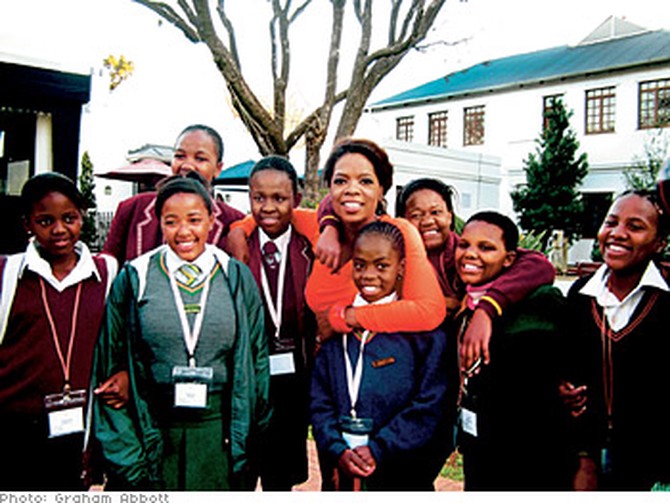
What lessons does Oprah want these girls to know for sure when they walk through the doors of her academy into the world? Her answer leaps from her own experience. She wants them to know that they are not defined by their circumstances. "What I learned at a very early age was that I was responsible for my life. And as I became more spiritually conscious, I learned that we all are responsible for ourselves, that you create your own reality by the way you think and therefore act. You cannot blame apartheid, your parents, your circumstances, because you are not your circumstances. You are your possibilities. If you know that, you can do anything."
That lesson is Oprah's own credo: "Trust your instincts. Honor your own truth. Discern it, know it and follow it. Is it right for me? That's my great business lesson." She'll be teaching the girls by satellite from Chicago, and sometimes in person, joining a staff of the finest teachers she can gather.
For those who are chosen, move-in day at the school will no doubt astound the girls and their families. "I want their parents to know they can trust me with their girls," she says. The thought of that day intensely affects her. Tears stream down her cheeks, perhaps a remnant of grief over her own early struggles, certainly hope for the future of these children: "It's the first time in my life that I've said I feel proud of myself." Turning to go, she says, "It has been a great day...a great day!"
That lesson is Oprah's own credo: "Trust your instincts. Honor your own truth. Discern it, know it and follow it. Is it right for me? That's my great business lesson." She'll be teaching the girls by satellite from Chicago, and sometimes in person, joining a staff of the finest teachers she can gather.
For those who are chosen, move-in day at the school will no doubt astound the girls and their families. "I want their parents to know they can trust me with their girls," she says. The thought of that day intensely affects her. Tears stream down her cheeks, perhaps a remnant of grief over her own early struggles, certainly hope for the future of these children: "It's the first time in my life that I've said I feel proud of myself." Turning to go, she says, "It has been a great day...a great day!"
From the January 2007 issue of O, The Oprah Magazine

